Unit_8__British_Foreign_Relations_(英国的外交关系)
英语国家概况(1)课程第2次形成性考核答案和讲评

英语国家概况(1)课程形成性考核题英语国家概况(1)课程第2次形成性考核答案和讲评(Unit 06-10)The United Kingdom (II)I. True or False:Unit 6 British Literature(T) 01. The early British literature was concerned with Christianity, and Anglo-Saxons produced many versions of the Bible. (Unit 6)(F) 02. There was a general flowering of culture and intellectual life in Europe during the 17th and 18th centurywhich is known as “The Renaissance”. (Unit 6)There was a general flowering of culture and intellectual life in Europe between the 14th and 17th centuries which is known as “The Renaissance”. (T)(T) 03. Keats, Shelley and Byron brought the Romantic Movement to its height. (Unit 6)(T) 04. Robinson Crusoe tells the story of a shipwreck and a solitary survival. (Unit 6)(F) 05. Writers of romantic literature are more concerned with the power of reason than with imagination andfeeling. (Unit 6)Writers of romantic literature are more concerned with imagination and feeling than with the power of reason. (T)(F) 06. Thomas Hardy, t he author of Tess of the D’Urbervilles, was a first-class novelist but a second-class poet.(Unit 6)Thomas Hardy, the author of Tess of the D’Urbervilles, was not only a first-class novelist but also a first-class poet. (T)Unit 7 British Education System(F) 07. The purpose of British education is to provide children with literacy and the other basic skills. (Unit 7)The purpose of British education is not only to provide children with literacy and the other basic skills but also to socialize the children. (T)(T) 08. The 1944 Education Act made entry to secondary schools and universities “meritocratic”. (Unit 7)(F) 09. British universities are mainly private bodies which collect funds by themselves. (Unit 7)British universities are mainly public bodies which receive funds from the central government. (T) (T) 10. In Oxford and Cambridge, the BA converts to an MA several years later, upon payment of a fee. (Unit 7) (F) 11. Grammar schools in Britain select children at the age of 11 and provide them with a language education.(Unit 7)Grammar schools in Britain select children at the age of 11 and provide them with a general education.(T)(T) 12. Comprehensive schools admit children without reference to their academic abilities. (Unit 7)Unit 8 British Foreign Relations(F) 13. When the Second World ended, Britain no longer was the largest military power in Western Europe.(Unit 8)When the Second World ended, Britain was the largest military power in Western Europe. (T)(F) 14. According to Unit 8, the most single important factor which influences British contemporary foreignpolicy is its history. (Unit 8)According to Unit 8, the contemporary foreign policy of the UK is greatly influenced by its imperialhistory and also by its geographical traits. (T)(T) 15. The Prime Minister and Cabinet decide on the general direction of Britain’s foreign policy. (Unit 8) (F) 16. Britain is a parliamentary monarch. (Unit 8)Britain is a parliamentary democracy and constitutional monarch. (T)(T) 17. Britain hosts a large military American presence and there are some American military bases in the UK.(Unit 8)(F) 18. Britain is not a member of the NATO due to its disagreement with some European countries on defencepolicy. (Unit 8)Britain is a member of the NATO despite its disagreement with some European countries on defence policy. (T)Unit 9 The British Media(T) 19. On an average day, an overwhelming majority of Britons over the age 15 read a national or local paper.(Unit 9)(F) 20. The British media play an important role in shaping a national education. (Unit 9)The British media play an important role in shaping a national culture. (T)(T) 21. Free press has the function of keeping an eye on the government, and therefore it is called the watchdog of parliamentary democracy. (Unit 9)(F) 22. The tabloids are larger format newspapers with colour photos and catchy headlines. (Unit 9)The tabloids are smaller format newspapers with colour photos and catchy headlines. (T)(T) 23. The British Broadcasting Corporation is funded by licence fees and viewers must buy a licence each year for their TV set. (Unit 9)(F) 24. The BBC World Service, the international branch of the BBC, broadcasts in English and 24 otherlanguages throughout the world. (Unit 9)The BBC World Service, the international branch of the BBC, broadcasts in English and 42 other languages throughout the world. (T)Unit 10 Sports, Holidays and Festival in Britain(F) 25. The tradition of having Sunday off derived from the Buddhism. (Unit 10)The tradition of having Sunday off derived from the Christian Church. (T)(F) 26. The origin of Bowling lies in the victory celebration ceremony by the modern soldiers. (Unit 10)The origin of Bowling lies in the victory celebration ceremony by the ancient warriors. (T)(F) 27. The game of Golf was invented by the Irish. (Unit 10)The game of Golf was invented by the Scottish. (T)(T) 28. The extremist animal-lovers’ group would like to have horse-racing banned. (Unit 10)(T) 29. Christmas Pantomime is one of the three Christmas traditions that are particularly British. (Unit 10) (T) 30. In Ireland, New Year’s Eve called Hogmanay (December 31st) is the major winter celebration. (Unit 10)II. Choose the best answer:Unit 6 British Literature01. Which of the following books is written by Geoffrey Chaucer? (Unit 6) Key AA. The Canterbury Tales.B. Beowulf.C. King Lear.D. Le Morte D’Arthur.02. Which literary form flourished in Elizabethan age more than any other form of literature? (Unit 6)Key CA. Novel.B. Essay.C. Drama.D. Poetry.03. Which of the following did NOT belong to Romanticism? (Unit 6) Key DA. Keats.B. Shelley.C. Wordsworth.D. Defoe.04. Which of the following is a tragedy written by Shakespeare? (Unit 6) Key BA. Dr. FaustusB. Macbeth.C. Frankenstein.D. The Tempest.05. Which of the following writers was NOT associated with Modernism? (Unit 6) Key CA. D. H. Lawrence.B. E. M. Foster.C. Charles Dickens.D. Virginal Woolf.06. Which of the following writers wrote the book “1984” that began “Postmodernism” in British literature”?(Unit 6) Key AA. George Orwell.B. Robert L. Stevenson.C. D. H. Lawrence.D. Virginia Woolf.Unit 7 British Education System07. In Britain, the great majority of parents send their children to ______. (Unit 7) Key CA. private schoolsB. independent schoolsC. state schoolsD. public schools08. In Britain, children from the age 5 to 16 ______. (Unit 7) Key BA. can legally receive partly free educationB. can legally receive completely free educationC. can not receive free education at allD. can not receive free education if their parents are rich09. Which of the following is a privately funded university in Britain? (Unit 7) Key DA. The University of Cambridge.B. The University of Oxford.C. The University of Edinburgh.D. The University of Buckingham.10. Which of the following is NOT a characteristic of the Open University? (Unit 7) Key CA. It’s open to everybody.B. It requires no formal educational qualifications.C. No university degree is awarded.D. University courses are followed through TV, radio, email and internet, etc.11. In the examination called “the 11 plus”, students with academic potential go to ______. (Unit 7)Key AA. grammar schoolsB. comprehensive schoolsC. public schoolsD. technical schools12. Which of the following is NOT true about the British education system? (Unit 7) Key DA. It’s run by the state.B. It’s funded by the state.C. It’s supervised by the state.D. It’s dominated by the state.Unit 8 British Foreign Relations13. Britain had a big influence on the post-World War II international order because ______. (Unit 8)Key BA. it used to be a great imperial powerB. it used to be a great imperial powerC. it defeated Hitler’s armyD. it got support from its former colonies.14. Which countries are the permanent members of the UN Security Council? (Unit 8) Key CA. France, China, Germany, Russia and Britain.B. The United States, France, Britain, Germany and Russia.C. China, Russia, France, Britain and the United States.D. Britain, China, France, the United States and Japan.15. How much of the globe did Great Britain rule in its imperial prime? (Unit 8) Key BA. One fourth of the globe.B. One fifth of the globe.C. One third of the globe.D. Two thirds of the globe.16. Which of the following is not involved in making British foreign policy? (Unit 8) Key AA. The Queen of the UK.B. The Foreign Commonwealth Office.C. The Prime Minister.D. The Cabinet.17. Which of the following countries does not have nuclear weapon capabilities? (Unit 8)Key CA. BritainB. The United StatesC. GermanyD. France.18. The Commonwealth is an organization of ______ that were once part of the British Empire. (Unit 8)Key BA. about 40 countriesB. about 50 countriesC. about 60 countriesD. about 70 countriesUnit 9 The British Media19. Which of the following is the world’s oldest national newspaper? (Unit 9)Key CA. The Times.B. The Guardian.C. The Observer.D. The Financial Times.20. Which of the following is the British oldest daily newspaper? (Unit 9) Key DA. The Telegraph.B. The News of the World.C. The Guardian.D. The Times21. A free press is considered very important to the functioning of parliamentary democracy because ______.(Unit 9) Key AA. it plays a watchdog function, keeping an eye on the governmentB. it informs people to current affairs in the worldC. it provides people with subjective reportsD. it publishes short pamphlets for Parliament22. How many newspapers are there in Britain? (Unit 9) Key DA. About 100.B. About 140.C. About 150.D. About 150.23. Which of the following about the BBC is NOT true? (Unit 9) Key CA. There is no advertising on any of the BBC programmes.B. The BBC is funded by licence fee paid by people who possess television sets.C. The BBC has four channels.D. The BBC provides the World Service throughout the world.24. Which of the following newspapers is a tabloid? (Unit 9) Key AA. The News of the World.B. East Enders.C. The Telegraph.D. The Guardian.Unit 10 Sports, Holidays and Festival in Britain25. Which of the following was NOT invented in Britain? (Unit 10) Key CA. Football.B. Tennis.C. Basketball.D. Cricket.26. Where is the International tennis championships held? (Unit 10) Key BA. Wembley.B. Wimbledon.C. London.D. Edinburgh.27. Which of the following is truly a sport of the royal family? (Unit 10) Key DA. Cricket.B. Skiing.C. GolfingD. Horse racing.28. Easter commemorates ______. (Unit 10) Key CA. the birth of Jesus ChristB. the Crucifixion of Jesus ChristC. the Crucifixion and Resurrection of Jesus ChristD. the coming of spring29. Which celebration particularly happens on the Queen’s birthday? (Unit 10) Key CA. Bonfires.B. The Orange March.C. Trooping the Colour.D. Masquerades.30. On which day is Halloween celebrated? (Unit 10) Key AA. October 31st.B. November 5th.C. March 17th.D. December 25th.III. E xplain the following terms:Unit 6 British Literature61. The Renaissance (Unit 6)The Renaissance is the period of time in Europe between 14th and 17th centuries, when art, literature, philosophy, and scientific ideas became very important and a lot of new art etc. was produced.62. Romanticism (Unit 6)Roughly the first third of the 19th century makes up English literature’s romantic period. Writers of romantic literature are more concerned with imagination and feeling than with the power of reason. A volume of poems called Lyrical Ballads written by William Wordsworth and Samuel Taylor Coleridge is regarded as the romantic poetry’s “Declaration of Independence”. Keats, Byron and Shelley, the three great poets, brought the Romantic Movement to its height. The spirit of Romanticism also occurred in the novel.63. Modernism (Unit 6)Modernism refers to a form of literature mainly written before World War II. It is characterised by a high degree of experimentation. It can be seen s a reaction against the 19th century forms of Realism. Modernist writers express the difficulty they see in understanding and communicating how the world works. Often, Modernism writing seems disorganized, hard to understand. It often portrays the action from the viewpoint of a single confused individual, rather than from the viewpoint of an all-knowing impersonal narrator outside the action. One of the most famous English Modernist writers is Virginia Woolf.Unit 7 British Education System64. Independent schools (Unit 7)Independent schools are commonly called public schools which are actually private schools receive their funding through the private sector and tuition rates, with some government assistance. Independent schools are not part of national education system, but quality of instruction and standards are maintained through visits from Her Majesty’s Inspectors of Schools. These schools are restricted to the students whose parents arecomparatively rich.65. The Open University (Unit 7)The Open University was founded in Br itain in the 1960’s for people who might not get the opportunity for higher education for economic and social reasons. It’s open to everybody and does not demand the same educational qualifications as the other universities. University courses are followed through TV, radio, videos and a net work of study centres. At the end of their studies at the Open University, successful students are awarded a university degree.Unit 8 British Foreign Relations66. The foundation of British foreign policy (Unit 8)The contemporary foreign policy of the UK is greatly influenced by its imperial history and also by its geographical traits. As Britain lost its empire recently, British policy-makers frequently forget that Britain is not as influential as it used to be in world affairs. Another decisive influence upon the way Britain handles its external affairs is geopolitical attitude to Europe.67. Britain and the EU (Unit 8)Britain joined the European Community in 1973 which is now called the EU. Britain’s pa rticipation in the EU remains controversial. At the centre of the controversy is the fact that it is not clear about what the EU is and what it will become. The UK has always been interested in encouraging free trade between countries and is therefore very supportive of the EU as a free trade area. Britain likes to regard the EU as a place where economic cooperation is possible and where a flow of trained personnel and goods are possible. But Britain has always been less enthusiastic about giving up its national sovereignty to the EU.68. Britain and the United States (Unit 8)The British foreign policy is also affected by its relationship with the United States. During World War II, the two countries were closely allied and continued to work together closely in the postwar years, because they had many things in common about the past and the world situation. Even today, Britain and American policy-makers share the general ideas in many respects. The British are beginning to realize that their own foreig n policy action can be limited by the U.S., but both sides worked hard to maintain the “special relationship”.69. The Commonwealth (Unit 8)The Commonwealth is a voluntary association of states which is made up mostly of former British colonies. There are about 50 members of the Commonwealth: many of these are developing countries like India and Cyprus; others are developed countries like Australia, Canada and New Zealand. The Commonwealth was set up a forum for continued cooperation and as a sort of support network.Unit 9 The British Media70. Quality papers (Unit 9)The quality papers belong to one of the categories of the national dailies. They carry more serious and in-depth articles of particular political and social importance. They also carry reviews, such as book reviews, and feature articles about high culture. These papers are also referred to as “the broadsheets” because they are printed on large size paper. The readers of such newspapers are generally a well-educated middle class audience.71. Tabloids (Unit 9)A tabloid is a small format newspaper with colour photos and catchy headlines. Tabloids are interested in scandals and gossip usually about famous people. They also carry lots of crime, sports and sensational human interest stories so as to attract readers. Stories are short, easy to read and often rely more on opinions than fact. They belong to a catalogue of national papers different from quality papers.Unit 10 Sports, Holidays and Festival in Britain72. Cricket and “fair play” (Unit 10)Cricket was one of the very first team sports in Britain to have organised rules and to be played according to the same rules nationally. The reason that fixed rules were applied to cricket so early on was a financial one: aristocrats loved betting on cricket matches and if people were going to risk money on a game, they wanted to ensure that the game would be played fairly. In Britain people from all walks of life play cricket, but in the 19th century, cricket was a sport played mai nly by the upper class. It was a kind of a “snob” game played by boys who attended public schools. As generations of public school boys grew up to become the civil servants and rulers of the UK and its colonies, cricket became associated with a set of moral values, in particular, the idea of “fair play” which supposedly characterised British government.73. Wimbledon (Unit 10)Wimbledon is the name of a London suburb. In Wimbledon, the world’s best players gather to compete on grass courts. It is one of the major events of the British sporting calendar and probably the most famous tennis event in the world. Besides actually watching the tennis matches, other activities closely associated with the “Wimbledon fortnight” are eating strawberries and cream,drinking champagne and hoping that it doesn’t rain.。
英语国家社会与文化入门unit 8 British Foreign Relations
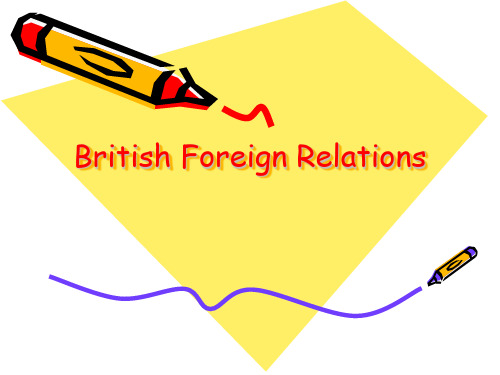
V. Britain and the United States
• the Suez Crisis during 1956
– The British are beginning to realize that their own foreign policy actions can be limited by the US. Afterward both sides have worked hard to maintain the “special relationship.
I. Britain Then and Now
• The glory of British empire • The influence of Second World War
could no longer afford to maintain its empire the British realized countries should be granted the independence.
•
Hale Waihona Puke IV. Britain and International Institutions
• Britain is also a member of the Commonwealth, a voluntary association of states which is made up of mostly former British colonies. There are 50 members of the Commonwealth including developing countries such as India and Cyprus and advanced industrial countries such as Australia, Canada and New Zealand.
英国文化第八单元课文原文
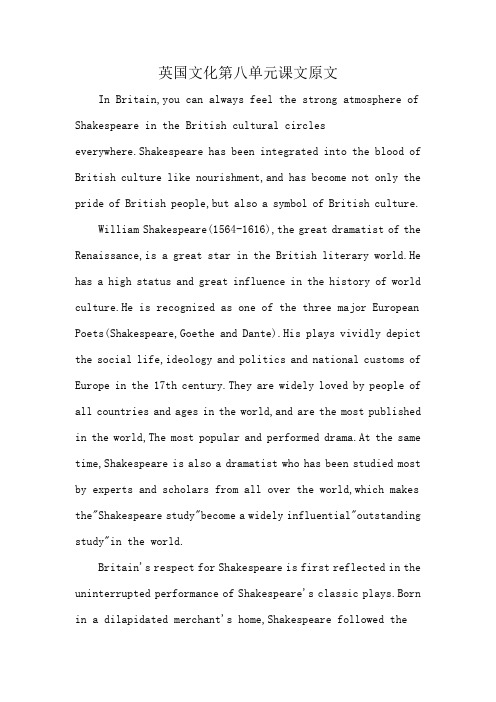
英国文化第八单元课文原文In Britain,you can always feel the strong atmosphere of Shakespeare in the British cultural circleseverywhere.Shakespeare has been integrated into the blood of British culture like nourishment,and has become not only the pride of British people,but also a symbol of British culture.William Shakespeare(1564-1616),the great dramatist of the Renaissance,is a great star in the British literary world.He has a high status and great influence in the history of world culture.He is recognized as one of the three major European Poets(Shakespeare,Goethe and Dante).His plays vividly depict the social life,ideology and politics and national customs of Europe in the 17th century.They are widely loved by people of all countries and ages in the world,and are the most published in the world,The most popular and performed drama.At the same time,Shakespeare is also a dramatist who has been studied most by experts and scholars from all over the world,which makes the"Shakespeare study"become a widely influential"outstanding study"in the world.Britain's respect for Shakespeare is first reflected in the uninterrupted performance of Shakespeare's classic plays.Born in a dilapidated merchant's home,Shakespeare followed thetroupe to tour all over the country since childhood.With only a primary school education,Shakespeare learned to write plays by virtue of his intelligence and diligence,and created 37 tragedies,comedies and historical plays and more than 150 sonnets,which is still a favorite play of British drama performing groups.Secondly,Britain's respect for Shakespeare is also reflected in the active excavation,protection and construction of cultural relics and buildings related to Shakespeare.The construction of Shakespeare's Globe Theatre is one of the representatives.The first performances of Shakespeare's plays were mostly held in the universal theater.In 1599,the Shakespeare Globe Theatre was first opened to the public.It was destroyed by fire in 1613.In 1614,the Shakespeare Theatre was rebuilt and used until ter,it was demolished because of the construction of a new house.The Shakespeare Global Theater,built by American film actor Sam warnamek in 1986,was rebuilt as is near the original Shakespeare Theater on the South Bank of the Thames River after obtaining permission.It is a theater built specifically for appreciating and studying the works of Shakespeare and the outstanding playwrights of his contemporaries.Thereconstruction lasted for 10 years,and was completed and opened to the public in June 1997.The theater is 13.7 meters high,and the internal and external structural design strives to reproduce the original appearance of the circular theater in the Shakespeare era,so as to help the audience experience and appreciate the dramatic Performing Arts in the Shakespeare era.Shakespeare's Globe Theatre's plays are generally arranged in the afternoon and evening.Artificial lighting is used inside the theatre to achieve the same effect as during the day.The theatre can accommodate up to 1600 people.After it was rebuilt and put into use in 1997,the Shakespeare Festival is held here every year to stage the works of Shakespeare and his contemporary playwrights,and the audience attendance rate reaches 90%.In December,1996,before the Shakespeare Theater was fully completed,it was awarded the Golden Star Award for European tourism promotion by the European Travel Journalists Association,and was rated as the best tourism landscape in Europe.In October,1999,when President Jiang Zemin visited London,he watched a special performance at Shakespeare's Globe Theatre.It can be seen that Shakespeare's status in British culture and the government's attention to Shakespeare andcultural relics that have everything to do with him.。
英语国家社会与文化入门第八单元
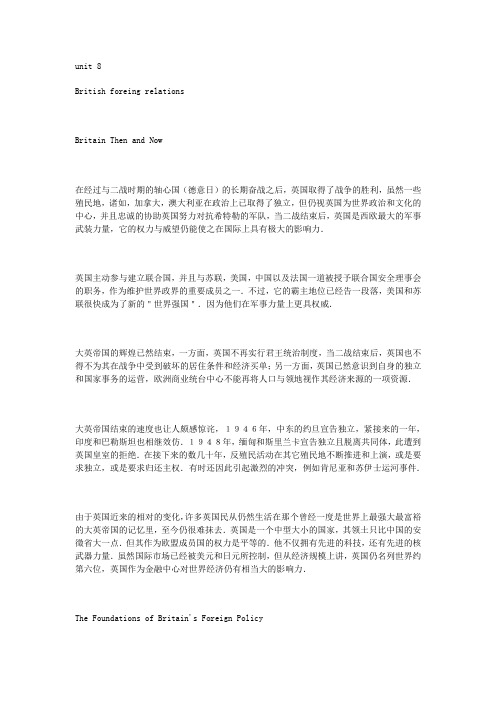
unit 8British foreing relationsBritain Then and Now在经过与二战时期的轴心国(德意日)的长期奋战之后,英国取得了战争的胜利,虽然一些殖民地,诸如,加拿大,澳大利亚在政治上已取得了独立,但仍视英国为世界政治和文化的中心,并且忠诚的协助英国努力对抗希特勒的军队,当二战结束后,英国是西欧最大的军事武装力量,它的权力与威望仍能使之在国际上具有极大的影响力.英国主动参与建立联合国,并且与苏联,美国,中国以及法国一道被授予联合国安全理事会的职务,作为维护世界政界的重要成员之一.不过,它的霸主地位已经告一段落,美国和苏联很快成为了新的"世界强国".因为他们在军事力量上更具权威.大英帝国的辉煌已然结束,一方面,英国不再实行君王统治制度,当二战结束后,英国也不得不为其在战争中受到破坏的居住条件和经济买单;另一方面,英国已然意识到自身的独立和国家事务的运营,欧洲商业统台中心不能再将人口与领地视作其经济来源的一项资源.大英帝国结束的速度也让人颇感惊诧,1946年,中东的约旦宣告独立,紧接来的一年,印度和巴勒斯坦也相继效仿.1948年,缅甸和斯里兰卡宣告独立且脱离共同体,此遭到英国皇室的拒绝.在接下来的数几十年,反殖民活动在其它殖民地不断推进和上演,或是要求独立,或是要求归还主权.有时还因此引起激烈的冲突,例如肯尼亚和苏伊士运河事件.由于英国近来的相对的变化,许多英国民从仍然生活在那个曾经一度是世界上最强大最富裕的大英帝国的记忆里,至今仍很难抹去.英国是一个中型大小的国家,其领土只比中国的安徵省大一点.但其作为欧盟成员国的权力是平等的.他不仅拥有先进的科技,还有先进的核武器力量.虽然国际市场已经被美元和日元所控制,但从经济规模上讲,英国仍名列世界约第六位,英国作为金融中心对世界经济仍有相当大的影响力.The Foundations of Britain's Foreign Policy英国现行外交政策受其帝国史和地缘政治特点影响很深.英国的历史大概是影响英国外交决策的一个最重要的单一因素.因为英国如此短的时间丧失了帝国的地位.英国外交政策的决策者们经常会忘记其已不再在世界事件上具有以住的影响力.历史学家认为,英国外交政策的制定者对于英国作为一个世界强国所发挥的作用持有非常保守和传统的观点,并以许多外交决策为例来说明这一点.其中之一的例子是对于英国保持独立的核武器能力并确保其在大多数国家的武装力量上的主权持有争议.英国的保守外交政策还表现向欧盟出让多少主权这一问题上争论不休.以上所提到的,第二个决定性的影响是其在地缘政治上控制它的外部事物.英国是个岛国这一点是一个重要的心理因素,同时也是一个影响国经济和军事发展的重要心理因素.作为一个航海国,它周游世界寻找领土和经济发展机遇.像拓加拿大殖民地是为了发展皮货贸易.把澳大利亚作为其流放罪犯最适宜的场地,将中国索取他们国家的饮品--茶.等等.英国岛国的地理位置使那里的居民产生了一种心理上的孤独感.在此之前,英国人想出国,他们不能依靠陆路穿越边界,而不得不依靠船或舰队,这通常需要的时间很长.由于航空业的发民以及最近开通的连接英国的海底隧道减少了英国在地理位置上的孤立.然后,从心里学上,英国人仍然时常感到孤立.英国对欧洲大陆反复无常的态度也是与欧洲大陆长期隔绝的因素.。
Unit_8__British_Foreign_Relations
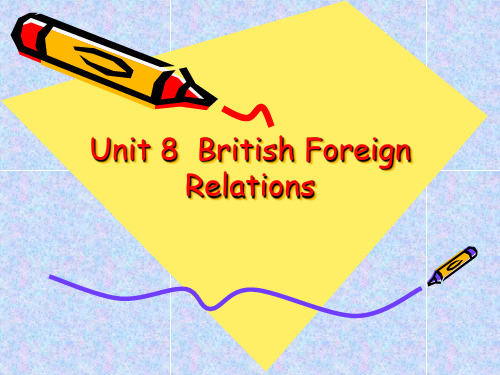
How many today?
• There are still 16 overseas possessions under the jurisdiction of the British: • Overseas Territory (9): Anguilla, Bermuda, British Indian Ocean Territory, British Virgin Islands, Cayman Islands, Gibraltar, he stunned the game LVL Island, St. Helena and its subsidiary Island, Turks and Caicos Islands .
The Treasury
Relations with other countries and organizations
• • • • • Britain Britain Britain Britain Britain and and and and and the UN the EU the Commonwealth NATO the US
How many colonies in the past?
• There are 56 countries and 2 regions under British rule • Oceania (14): Australia, New Zealand, Vanuatu, Tuvalu, Solomon Islands, Samoa, Nauru, Saint Vincent and the Grenadines, Saint Lucia, Saint Kitts and Nevis, Papua New Guinea, Fiji , Barbados, Kiribati.
专八人文知识总结
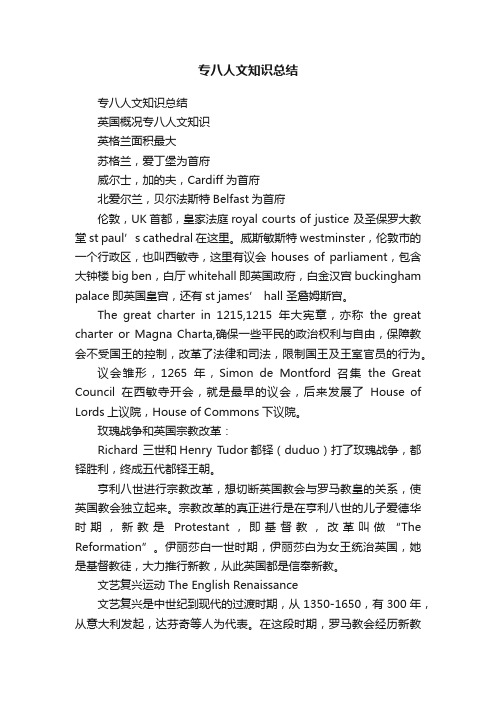
专八人文知识总结专八人文知识总结英国概况专八人文知识英格兰面积最大苏格兰,爱丁堡为首府威尔士,加的夫,Cardiff为首府北爱尔兰,贝尔法斯特Belfast为首府伦敦,UK首都,皇家法庭royal courts of justice 及圣保罗大教堂st paul’s cathedral 在这里。
威斯敏斯特westminster,伦敦市的一个行政区,也叫西敏寺,这里有议会houses of parliament,包含大钟楼big ben,白厅whitehall即英国政府,白金汉宫buckingham palace即英国皇宫,还有st james’ hall 圣詹姆斯宫。
The great charter in 1215,1215年大宪章,亦称the great charter or Magna Charta,确保一些平民的政治权利与自由,保障教会不受国王的控制,改革了法律和司法,限制国王及王室官员的行为。
议会雏形,1265年,Simon de Montford 召集the Great Council在西敏寺开会,就是最早的议会,后来发展了House of Lords上议院,House of Commons下议院。
玫瑰战争和英国宗教改革:Richard 三世和Henry Tudor都铎(duduo)打了玫瑰战争,都铎胜利,终成五代都铎王朝。
亨利八世进行宗教改革,想切断英国教会与罗马教皇的关系,使英国教会独立起来。
宗教改革的真正进行是在亨利八世的儿子爱德华时期,新教是Protestant,即基督教,改革叫做“The Refor mation”。
伊丽莎白一世时期,伊丽莎白为女王统治英国,她是基督教徒,大力推行新教,从此英国都是信奉新教。
文艺复兴运动 The English Renaissance文艺复兴是中世纪到现代的过渡时期,从1350-1650,有300年,从意大利发起,达芬奇等人为代表。
在这段时期,罗马教会经历新教改革,人文主义兴起,海外探索(大航海时代?)。
【VIP专享】英语概况上册第8单元英国外交关系翻译
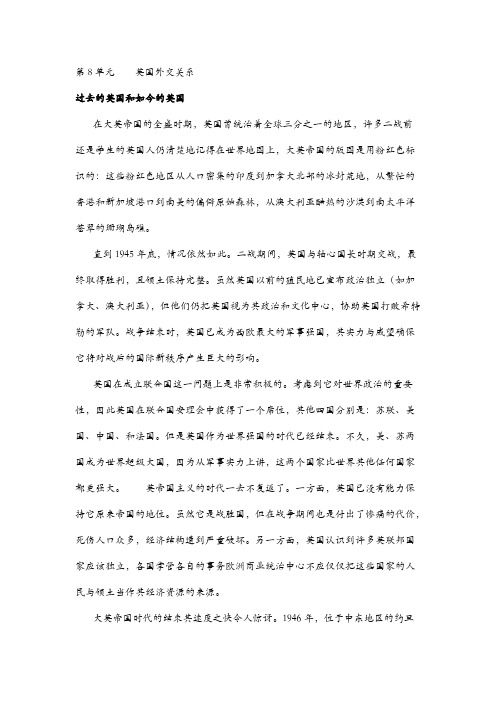
第8单元英国外交关系过去的英国和如今的英国在大英帝国的全盛时期,英国曾统治着全球三分之一的地区,许多二战前还是学生的英国人仍清楚地记得在世界地图上,大英帝国的版图是用粉红色标识的:这些粉红色地区从人口密集的印度到加拿大北部的冰封荒地,从繁忙的香港和新加坡港口到南美的偏僻原始森林,从澳大利亚酷热的沙漠到南太平洋苍翠的珊瑚岛礁。
直到1945年底,情况依然如此。
二战期间,英国与轴心国长时期交战,最终取得胜利,且领土保持完整。
虽然英国以前的殖民地已宣布政治独立(如加拿大、澳大利亚),但他们仍把英国视为其政治和文化中心,协助英国打败希特勒的军队。
战争结束时,英国已成为西欧最大的军事强国,其实力与威望确保它将对战后的国际新秩序产生巨大的影响。
英国在成立联合国这一问题上是非常积极的。
考虑到它对世界政治的重要性,因此英国在联合国安理会中获得了一个席位,其他四国分别是:苏联、美国、中国、和法国。
但是英国作为世界强国的时代已经结束。
不久,美、苏两国成为世界超级大国,因为从军事实力上讲,这两个国家比世界其他任何国家都更强大。
英帝国主义的时代一去不复返了。
一方面,英国已没有能力保持它原来帝国的地位。
虽然它是战胜国,但在战争期间也是付出了惨痛的代价,死伤人口众多,经济结构遭到严重破坏。
另一方面,英国认识到许多英联邦国家应该独立,各国掌管各自的事务欧洲商业统治中心不应仅仅把这些国家的人民与领土当作其经济资源的来源。
大英帝国时代的结束其速度之快令人惊讶。
1946年,位于中东地区的约旦宣告独立。
第二年,印度、巴基斯坦相继独立。
1948年,缅甸、锡兰(即现在的斯里兰卡)宣告独立并脱离了英联邦,拒绝承认英国君主作为他们新型国家的领导。
在今后的几十年中,非殖民主义化进程继续,其它的领土和殖民地都相继独立或重新回到原统治者手中。
有时,国家独立的过程是充满暴力的,比如肯尼亚和埃及。
由于大英帝国的衰落只是近些年的事许多活着的人还清楚地记得英国曾经是世界上最强大、最富有的国家之一。
Unit 8 British Foreign Relations
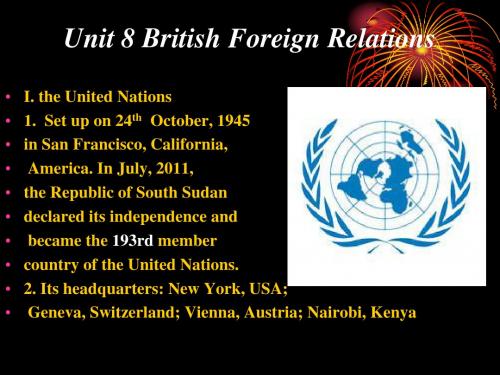
The European Union
1. First called European Community founded in 1952 2. Transformed into European Union in 1993 based in Brussels, the capital of Belgium 2. 27 member countries 3. The 12 yellow stars signifies perfection and the Virgin Maria
The Independence of Canada
• The factors of Canadian Independence: • 1. the pressure from the USA at that time: The United States became independent and bought Alaska from Russian so the Canadian leaders then were eager to set up a country with its own government. • 2. the changing of Britain’s attitudes: The purpose of colonies was to produce wealth but Britain spent more on them. Furthermore, the transportation and communication worsened the problem and it became impossible for Britain to protect its colonies. • 3. the construction of the railways: facilitated the contact with the west coast region and promoted the building of a country. • 4. desire for new trade partners: formerly, only between Britain and its colonies: free transaction tax. But later many other countries enjoyed it. Canada as a colony didn’t enjoy much
英美文化概论提纲

英美文化概论提纲Unit 1 a brief introduction to the united kingdom 1一 a brief introduction1.全称 The United Kingdom of Great Britain and northern Ireland--P17 III 12.构成England LondonScotland EdinburghWales CardiffNothern Ireland Belfast--P17 III23.历史A公元43世纪RomanB公元7世纪Anglo –saxons 安格鲁撒克逊人C 8世纪末阿尔弗雷德大帝King Alfred北欧海盗D 1066年诺曼征服NormansWilliam of NormandyBattle of HastingsKing Harold4.英国内战 civil war 资产阶级革命二Scotland1. Glasgow 最大城市 --P16 II 82. 大学15世纪 ancient and international university --P17 III 11三WalesUnlike England it did not fall to the Anglo-Saxon invaders of the 5th century --P16 II 11名词解释London:the largest city located in the south of the country .London is dominant in the UK in all fields;government finance and culture.London is one of the top three financial centers in the worldUnit 2 a brief introduction to the united kingdom iiNorthern Ireland1.宗教爱尔兰人是天主教徒 Catholics英国人是新教徒 Protestants--P33 I 62.1921年独立 Irish State (分水岭)3.爱尔兰南部26郡成立自由邦北部6 郡仍属英国—P34 II 104 .Loyalist 民族派希望加入爱尔兰共和国Unionist 联合派亲英国5.The official IRA 倾向于政治手段解决–P34 III 4The Provisional IRA 军事–P35 III 5“The Bullet and the Ballot Box”—P35 III 106.区分 Sinn Fein是政党 --P33 I 8/P35 III 11,121919 IRA是军事团体非政党7 .1973年 Power-Sharing mechanism权利分享机制—P34 II 88.1972 “Bloody Sunday”—P34 II 79.1985 Anglo-Irish agreement --P33 I 910. Downing –Street Declaration唐宁街宣言授权英军司令直接干预北爱治安事务名词解释1.”Home-rule”:1914年被签署成为法律。
英语国家社会与文化入门 上册缩略版简答题 答案
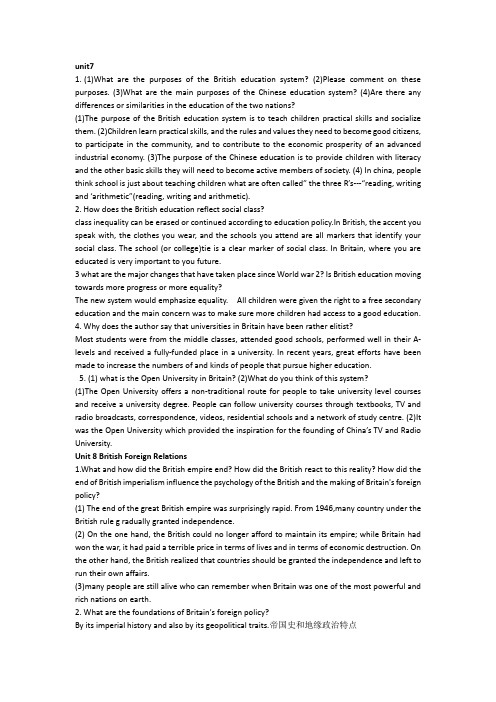
unit71.(1)What are the purposes of the British education system? (2)Please comment on these purposes. (3)What are the main purposes of the Chinese education system? (4)Are there any differences or similarities in the education of the two nations?(1)The purpose of the British education system is to teach children practical skills and socialize them. (2)Children learn practical skills, and the rules and values they need to become good citizens, to participate in the community, and to contribute to the economic prosperity of an advanced industrial economy. (3)The purpose of the Chinese education is to provide children with literacy and the other basic skills they will need to become active members of society. (4) In china, people think school is just about teaching children what are often called” the three R’s---“reading, writing and ‘arithmetic”(reading, writing and arithmetic).2. How does the British education reflect social class?class inequality can be erased or continued according to education policy.In British, the accent you speak with, the clothes you wear, and the schools you attend are all markers that identify your social class. The school (or college)tie is a clear marker of social class. In Britain, where you are educated is very important to you future.3 what are the major changes that have taken place since World war 2? Is British education moving towards more progress or more equality?The new system would emphasize equality. All children were given the right to a free secondary education and the main concern was to make sure more children had access to a good education.4. Why does the author say that universities in Britain have been rather elitist?Most students were from the middle classes, attended good schools, performed well in their A-levels and received a fully-funded place in a university. In recent years, great efforts have been made to increase the numbers of and kinds of people that pursue higher education.5. (1) what is the Open University in Britain? (2)What do you think of this system?(1)The Open University offers a non-traditional route for people to take university level courses and receive a university degree. People can follow university courses through textbooks, TV and radio broadcasts, correspondence, videos, residential schools and a network of study centre. (2)It was the Open University which provided the inspiration for the founding of China’s TV and Radio University.Unit 8 British Foreign Relations1.What and how did the British empire end? How did the British react to this reality? How did the end of British imperialism influence the psychology of the British and the making of Britain's foreign policy?(1) The end of the great British empire was surprisingly rapid. From 1946,many country under the British rule g radually granted independence.(2) On the one hand, the British could no longer afford to maintain its empire; while Britain had won the war, it had paid a terrible price in terms of lives and in terms of economic destruction. On the other hand, the British realized that countries should be granted the independence and left to run their own affairs.(3)many people are still alive who can remember when Britain was one of the most powerful and rich nations on earth.2. What are the foundations of Britain's foreign policy?By its imperial history and also by its geopolitical traits.帝国史和地缘政治特点3. How is Britain's foreign policy made? Does the government's foreign policy represent the desires of British citizens?(1)The Prime Minister and Cabinet decide on the general direction of Britain's foreign policy. The main government department involved is of course the Foreign and Commonwealth Office (FCO), but many other government ministries also play a part in formulating and executing the government's decisions.(2) Since Britain is a parliamentary democracy, the government's foreign policy in theory represents the desires of its electorate, but in fact British citizens are more concerned about issues closer to home.4. Why does the author say that the decision to join the EC was and remains controversial in Britain?1)The decision to join the EEC was very controversial.The UK has always been very interested in encouraging free trade between countries and is therefore very supportive of the EU as a free trade area.2)However, the UK has always been less enthusiastic about giving up its national sovereignty (that is, its control over national decision-making) to a European government.5. Why does the author think that Britain has the "special relationship" with the United States? Does this relationship still exist?Because they shared many of the same worries aboutthe Soviet Union. Even today, in many respects British and American policy-makers agree generally on, for example, how the global economy should be managed, how a warlike state should be dealt with, issues about arms control and so on.6.What was the purpose of establishing the NATO in the author's opinion? Do you agree with him? Explain your point.1)The purpose of NATO is to protect member states against aggression, to provide a foundation for security in Europe, and to provide a form for transatlantic defence cooperation.2)We disagree with the opinion. Actually, the United States is striving to lead and dominate NATO and using it as a means to materialize its global hegemon dream.Unit 9 The British Media1. The author says that “the media” are central to British leisure culture”, why does the author say so? What are some of the similarities and differences in terms of the function between the British media and the Chinese media?作者说:“媒体”是英国休闲文化的中心“,为什么作者这样说?英国媒体与中国媒体在功能上的相似性和不同点是什么?(1)On an average day, 90 per cent of Britons over the age of 15 read a national or local paper.96 percent of the population watch TV at least once a week. It is obvious, then, that the media are central to British leisure culture.2.What are some of the characteristics of British newspaper culture? In what way is it different from the United States?1)British newspaper culture is unusual in the extent to which class and educational differences are reflected in the newspapers people read.2)In the United States, newspaper reading is a mainly middle-class habit, but in Britain the "lower classes" are also regular readers.1)英国报纸的文化在一定程度上是不寻常的,在一定程度上反映了阶级和教育的差异。
2020版《英美国家文化概况》教学大纲
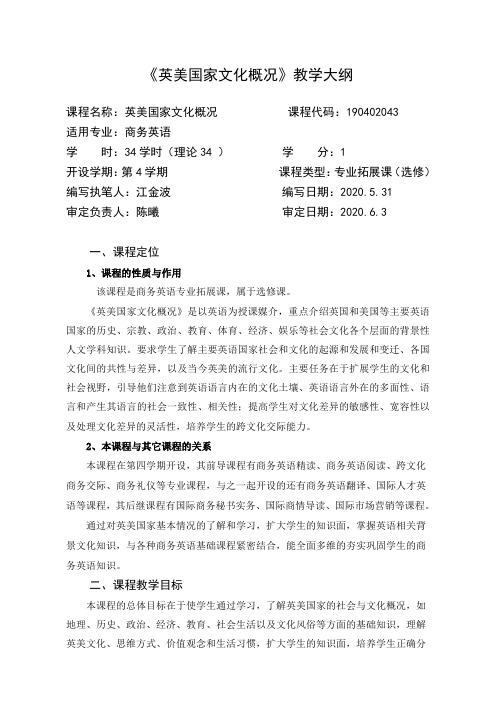
《英美国家文化概况》教学大纲课程名称:英美国家文化概况课程代码:190402043适用专业:商务英语学时:34学时(理论34 )学分:1开设学期:第4学期课程类型:专业拓展课(选修)编写执笔人:江金波编写日期:2020.5.31审定负责人:陈曦审定日期:2020.6.3一、课程定位1、课程的性质与作用该课程是商务英语专业拓展课,属于选修课。
《英美国家文化概况》是以英语为授课媒介,重点介绍英国和美国等主要英语国家的历史、宗教、政治、教育、体育、经济、娱乐等社会文化各个层面的背景性人文学科知识。
要求学生了解主要英语国家社会和文化的起源和发展和变迁、各国文化间的共性与差异,以及当今英美的流行文化。
主要任务在于扩展学生的文化和社会视野,引导他们注意到英语语言内在的文化土壤、英语语言外在的多面性、语言和产生其语言的社会一致性、相关性;提高学生对文化差异的敏感性、宽容性以及处理文化差异的灵活性,培养学生的跨文化交际能力。
2、本课程与其它课程的关系本课程在第四学期开设,其前导课程有商务英语精读、商务英语阅读、跨文化商务交际、商务礼仪等专业课程,与之一起开设的还有商务英语翻译、国际人才英语等课程,其后继课程有国际商务秘书实务、国际商情导读、国际市场营销等课程。
通过对英美国家基本情况的了解和学习,扩大学生的知识面,掌握英语相关背景文化知识,与各种商务英语基础课程紧密结合,能全面多维的夯实巩固学生的商务英语知识。
二、课程教学目标本课程的总体目标在于使学生通过学习,了解英美国家的社会与文化概况,如地理、历史、政治、经济、教育、社会生活以及文化风俗等方面的基础知识,理解英美文化、思维方式、价值观念和生活习惯,扩大学生的知识面,培养学生正确分析有关英美等国问题的能力,并能以正确的眼光看待世界上所发生的问题,提高学生对文化差异的敏感性和宽容性,培养学生跨文化交际能力。
同时也促进加强学生的语言学习,达到提高其商务英语水平的目的。
Unit8Topic2课文背景知识

Unit 8 Topic 2背景知识英美人的衣着现在英美的服装(clothing)从总体趋势上是向舒适和多样化发展,非正式的服装渐渐占了上风。
运动服(sportswear)、针织休闲装流行,便装夹克(jacket)和牛仔长裤(blue jeans)渐成人们的日常便装。
虽然在正式场合,如社交或会议,人们还要穿传统的西装套服(dress)。
帽子是英美人不可缺少的。
英国的黑色圆顶礼帽“波乐”(bowler)曾是英国绅士的象征。
美国的帽子种类很多,除普通的帽子,还有高尔夫帽、猎帽、棒球帽、骑士帽等。
女士们的帽子更是醒目的装饰品。
在不同的场合,人们戴不同的帽子。
在社交等正式场合,男子们大多身着三件一套的西装套服。
打着领带(necktie),女士们则着晚礼服。
而在普通集会或宴会时,衣着自便,但如果请柬上注明了服装要求,就必须按要求着装。
在公共场所,人们可以穿T恤衫(T-shirt),但不会只穿背心(vest)出入。
此外,不能穿睡衣(pajamas∕pə'dзæməz∕)出门,若晚上有客人来,则要在外面套上睡袍才能开门见客。
说到最流行的裤子,无疑是牛仔裤了。
40年代末,美国掀起了“淘金热”。
一个叫利维·斯特劳斯的布商也来到旧金山。
他用所带的厚帆布裁制出低腰,窄臀、直腿的裤子,坚固耐用又使人显得精干利落,博得工人的喜爱,并流传到全世界。
部分常用服装词有:clothes衣服dress 大衣overcoat 风衣windbreak 雨衣raincoat 大礼服(男)full dress coat 晚礼服(女)evening dress 背心vest西服背心waist-coat 衬衣(男)shirt 衬衣(女)bloues 毛衣sweater 睡衣pajamas 制服uniform 便装茄克jacket 工作服overall 运动服sportswear 游泳衣swimming suit 短裤shorts 长裤trousers 裙子skirt 超短裙mini-skirt 连衣裙dress 罩袍robe 腰带belt T恤衫T-shirt 领带necktie 领结bowtie 手套gloves 短袜sock 便帽cap 草帽straw hat 鞋shoes 靴boots。
高等学校研究生英语综合教程上Unit_8
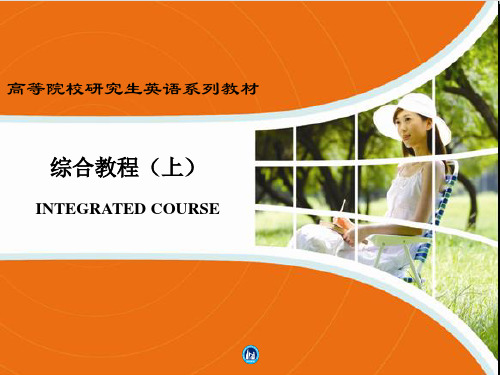
Reading Focus – Language Point
1. Seat belts still decrease our risk of dying in an accident, but the statistics are not all black and white. (Para. 1)
Starting out—Task 1
Task 1
Work in pairs. Choose your favorite car from the cars given on P220 and tell your partner why you like it best.
Starting out—Task 2
Reading Focus – Detailed Information
Task 2
Choose the sentence that best expresses the meaning of the sentence from the text.
Key: 1 A 2 B 6 A 7 B 3 A 4 A 5 B 8 B 9 B 10 A
redistribute: v. to give something to each member of a group so that it is divided up in a different way from before 再分配,再分发 e.g.: Their primary concern was to redistribute income from rich to poor.
Reading Focus – Language Point
5. Consequently, any single measurement assigned to the risk of driving a car is bound to be only the roughest sort of benchmark. (Para. 5) benchmark: something that is used as a standard by which other things can be judged or measured 基准 e.g. 1) The valuation becomes a benchmark against which to judge other prices. 2) Tests at the age of seven provide a benchmark against which the child’s progress at school can be measured.
英美国家概括 判断正误 英国部分

英美国家概括判断正误The United Kingdom of Great Britain and Northern Ireland Unit 11.Britain is no longer an imperial(帝国) country. T2.The Commonwealth(共和国,民主国) of Nations includes all European countries. F3.1 in 10 of the British population are of non-European ethnicity(种族地位,种族特点). F4.The stereotype(陈规,刻板模式) of the English gentleman never applied(使适用) the majority of the British people. T5.Great Britain includes 3 constituent countries;England, Scotland, and Wales. T6.Northern Ireland is part of Great Britain. F7.When people outside the UK talk about England, they mistake it as Britain sometimes. T8.The Scots and Welsh have a strong sense of being British. F9.Scotland was never conquered by the Romans. T10.Most people in Scotland speak the old Celtic language, called “Gaelic”. F11.Scotland was unified with England through peaceful mean. T12.Wales is rich in coal deposits. T13.Cardiff, the capital of Wales, is a large city. F ?? largest14.The title of Prince of Wales is held by a Welsh according to tradition. F威尔士在1284年被英格兰合并,在爱德华一世征服了威尔士(1277年—1284年)的过程中,他按照威尔士人的要求:“一位在威尔士出生、不会讲英语、生下来第一句话说威尔士语的亲王”作为他们的领袖,爱德华一世将其即将分娩的王后接到威尔士,王子出生后即被封为威尔士亲王,以表示对威尔斯的重视并强化威尔士人的认同感,从此以后,英皇室便将皇储封为威尔士王子,皇子妃封为威尔士王妃,成为皇室继承法统规则之一。
英语国家概况unit8
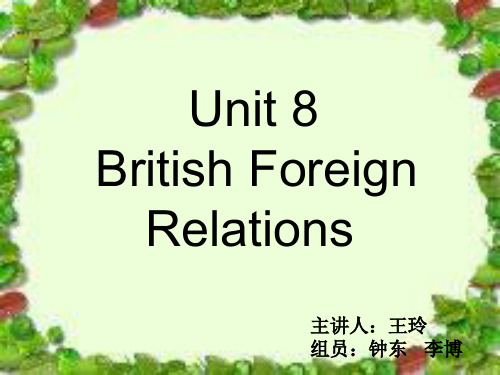
本单元重点内容
• Because the UK had a strong military power and prestige ,it had a big influence on the postwcolonies –Australia and Canada-still looked to Britain as the center of their political and cultural world.)
Britain and International Institutions
Nowadays its foreign policy is largely shaped by its participation in a number of important international institutions. 1.Britain is one of the five permanent members of the United Nations Security Council, along with Russia , China , the US ,and France.
Britain and the United States
3.The special relationship with the United States has gone through many ups and downs. The major test of Anglo-American relations occurred during 1965 Suez Crisis.
•
•
本单元重点内容
• After the Second World War ,the British empire began to decline as more and more former colonies declared their political independence • Today the age of British imperialism is gone. But the British foreign policy in still influenced by Britain’s imperial past. (Why?)
unit 9 British Foreign Relations
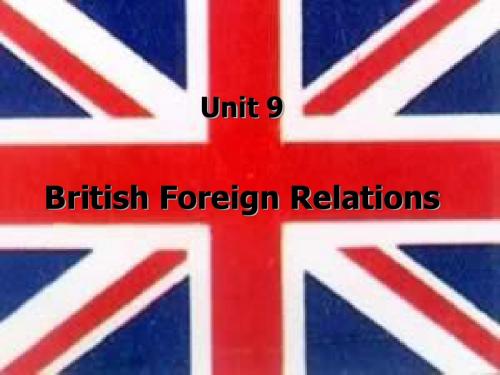
decide on the general direction
the Foreign & Commonwealth Office (FCO) plays a significant role in the making of Britain’s foreign policy Other departments
Unit 9
British Foreign Relations
•Focal Points to be discussed
1. Britain Then and Now 2.The Foundations of Britain’s Foreign Policy 3. The Making of Britain’s Foreign Policy 4. Foreign Relations 5. British Security and Defense Policy
Ⅳ British Foreign Relations
Britain & International Institutions
-- one of the five permanent members of the United Nations Security Council -- the 6th largest contributor to the UN’s budget
Ⅰ Britain Then and Now
During the WWII, the Allies vs. the Axis
After the war, although suffered a lot, it was still the largest military power in Western Europe.
- 1、下载文档前请自行甄别文档内容的完整性,平台不提供额外的编辑、内容补充、找答案等附加服务。
- 2、"仅部分预览"的文档,不可在线预览部分如存在完整性等问题,可反馈申请退款(可完整预览的文档不适用该条件!)。
- 3、如文档侵犯您的权益,请联系客服反馈,我们会尽快为您处理(人工客服工作时间:9:00-18:30)。
Unit 8 British Foreign Relations (英国的外交关系)一、本单元重点内容1. Active in setting up the United Nations (积极推进联合国的成立)2. Foreign policy influenced by its history and geopolitical traits(受其历史和地缘政治影响的外交政策)3. Long-term physical separation from the European continent (长期与欧洲大陆隔绝)4. The involvement of the Foreign and Common wealth Office (英国外交与联邦事务部的参与)5. The Treasury (财政部)6. The permanent member of the UN Security Council [(英国)是联合国常任理事国之一]7. The member of the European Union (欧盟成员国之一)8. The member of the Commonwealth (英联邦的成员国)9. The special relationship with the United States (与美国的特殊关系)10. The presence of superpower bases in Britain (在英国存在超级大国的军事基地)11. Its participation in NATO [积极参与北约(北大西洋公约组织)的活动]二、本单元重、难点辅导1. the British empire and its endThe Britain used to rule 1/3 of the globe and thus became a great empire in the world. After the WWII, the British empire began to decline as more and more former colonies declared their political independence. Throughout the next few decades, the process of decolonization continued, though sometimes the process was full of violence. The end of the great British empire was inevitable. Today the age of British imperialism is gone. But the British foreign policy is still influenc ed by Britain’s imperial past. An d because it had a strong military power and prestige, it had a big influence on the postwar international order. (*Some former colonies—Australia and Canada— still looked to Britain as the center of their political and cultural world.)2. the foundations of British foreign policyThe contemporary foreign policy of the UK is greatly influenced by its imperial history and also by its geopolitical traits(地缘政治特点). 1)As Britain lost its empire so recently, British policy-makers frequently forget that Britain is not as influential as it used to be in world affairs. 2)Another decisive influence upon the way Britain handles its external affairs is geopolitical. As Britain is an island, it has created a sense of isolation in its subjects, which results in Britain’s schizophrenic(精神分裂的,反复无常的) attitude to Europe. (But Britain’s physical isolation has long been reduced by the development of airlines and more recently by the opening of the Channel Tunnel, which links Britain to continental Europe) 当代英国的外交政策很大程度上受其帝国主义历史和地缘政治特点的影响。
由于英国失去其帝权的时间还不长,英国的决策者们经常会忘记英国在世界事务中已经不如从前那样有影响力了这一事实。
影响英国处理外事的的另一决定性因素是其地缘政治特点。
英国岛国的地理位置使那里的居民产生了一种心理上的孤独感,这导致英国对于欧洲的态度反复无常。
(但是这个问题由于飞机的发明和联系英国与欧洲大陆的海底隧道的开通而得到缓解。
)3. the making of Britain’s foreign policy 英国外交政策的制定The general direction of Britain’s foreign policy is mainly decided by the Prime Minister and Cabinet. The Foreign and Commonwealth Office (FCO)(英国联邦与国际事务部), the main government department, plays a significant role in themaking of Britain’s foreign policy. Many other government ministries such as the Ministry of Defence and the Department of Trade and Industry also play a part in formulating and carrying out the government’s d ecisions. But an extremely influential player in Britain’s foreign policy is the Treasury. The Treasury makes decisions on how much money other departments can have each year.英国外交政策的总体方向主要由首相和其内阁决定. 英国政府的主要部门,英国联邦与国际事务部, 在制定英国的外交政策方面起着重要的作用。
许多其它的政府部门,比如,国防部,贸易与工业部在制定和执行政府的决议中也起着重要作用。
但是对英国的外交政策影响极大的一个部门就是财政部。
其它部门每年可以花费的金额由财政部来决定。
* Britain is parliamentary democracy, the government’s foreign policy in theory represents the desi res of its electorate.4. Britain’s relationship with international institutions1) one of the 5 permanent members of the UN Security Council (联合国安理会常任理事国) — Russia, China, the US, France and the UK2) its membership in the European Union (Britain joined the European Economic Community in 1973, which has been called European Union since 1993. Britain’s participation in the EU remains controversial. At the center of the controversy is the fact that it is not clear about what the EU is and what it will become. The UK has always been interested in encouraging free trade between countries and is therefore very supportive of the EU as a free trade area. Britain likes to regard the EU as place where economic cooperation is possible and where a flow of trained personel and goods are possible. But Britain ha always been less enthusiastic about giving up its national sovereignty to a European government.)英国于1973年加入欧洲经济共同体,1993年,欧共体被更名为欧盟.英国加入欧盟一事备受争议.争议的焦点是:关于欧盟的本质是什么,发展方向是什么,都不清楚.英国一直积极鼓励国与国之间的自由贸易,因此比较倾向于把欧盟看作是一个自由贸易区。
英国喜欢把欧盟看作是一个可以进行经济合作的地方,人员和商品都可以自由流通的地方。
